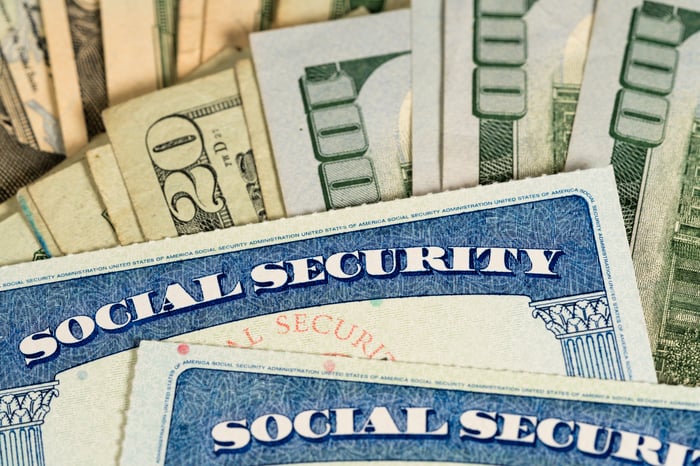Every month, Social Security doles out payments to nearly 65 million Americans, over 46 million of whom are retired workers. Without this guaranteed payout, more than 15 million retirees would be living below the federal poverty line.
Ensuring the financial well-being of our nation's seniors requires a lot of incoming capital. In 2019, Social Security collected $1.06 trillion in revenue, with the 12.4% payroll tax on earned income providing the program with $944.5 billion. Though the payroll tax is Social Security's workhorse and will remain so for the foreseeable future, there are 10 sources of income it can't touch.

Image source: Getty Images.
1. Exempt wage income
Social Security's payroll tax is applied to all wage and salary income between $0.01 and $137,700 in 2020. Next year, this upper bound, which is known as the maximum taxable earnings cap, is increasing by $5,100 to $142,800. Since 94% of working Americans earn less than this cap, they pay into Social Security on every dollar they earn.
Any wages or salary above the taxable earnings cap is exempt. For instance, a person with a $200,000 salary in 2021 will pay into Social Security on the first $142,800 in income. The remaining $57,200 will be exempt from the payroll tax.
2. Capital gains
According to a March 2020 report released by Pew Research Center, 52% of all families had direct or indirect investments in the stock market. When those investors choose to sell their holdings, the profit they generate is known as a capital gain. While there may be federal taxes associated with selling stocks or other assets depending on how long you held the asset and what income tax bracket you fall into, capital gains are exempt from Social Security's payroll tax.
3. Dividend income
As a general rule, investment income doesn't fall under the same umbrella as earned income, which means it's going to be exempt from the payroll tax. This includes any dividend income you may be receiving from the stocks you own. That's great news because dividend stocks have historically run circles around those that don't pay dividends. Feel free to buy those dividend stocks with confidence.

Image source: Getty Images.
4. Bond income
Interest income earned from bonds is also exempt. As an added boost for bondholders, certain types of bonds are also exempt from federal and/or state taxation. A good example would be municipal bonds purchased within the state you reside. In many instances, the interest earned on muni bonds is exempt from federal, state, and payroll taxation.
5. CD interest income
With the Federal Reserve holding its federal funds target rate at a record-tying low, the yields on bank certificates of deposit (CDs) have fallen to uninspiring levels -- 0.41%, on average, for a five-year CD. Nevertheless, should investors choose to park their money in a CD offered by a financial institution, the interest earned is exempt from the payroll tax. Like capital gains and dividend income, though, CD interest income may be subject to federal and state taxation.
6. Supplemental Security Income
As of October, just over 8 million people were receiving a Supplemental Security Income (SSI) payment each month. SSI is overseen by the Social Security Administration and divvied out primarily to low-income seniors, the blind, and asylum seekers. Though it's often conflated with traditional Social Security, the two programs have very different sources of funding. SSI recipients' monthly payouts are not subject to Social Security's payroll tax.

Image source: Getty Images.
7. Workers' compensation income
If you've ever been hurt on the job, you may have qualified for and received workers' compensation income. Most businesses are required to carry some form of workers' compensation insurance to cover workplace accidents.
Generally speaking, workers' compensation income isn't taxable, which means it avoids the payroll tax. There are exceptions, however. For example, if an injured worker is also receiving Social Security Disability Income or SSI benefits along with workers' compensation, their workers' comp payout could be subject to federal tax.
8. Student income
There are around 20 million college students in the United States. But did you know that if these students get a job on campus, they can avoid owing payroll tax on what they earn? Students who prove that they're fully enrolled in college and attending their classes qualify.
9. Rental income
There's also a pretty good chance that any rental income you collect won't be subject to the payroll tax. If you own property that you lease, the money you bring in is exempt. The one exception is if you're defined as a real estate professional -- i.e., you perform at least 750 hours a year in real estate property trades or business. If you meet the definition of a real estate professional, then you will owe payroll tax on what you're collecting.
10. Ministerial income
Finally, church ministers who receive income should expect their earnings to be exempt from the payroll tax. As long as a minister can show that they're ordained, commissioned, or licensed by a church or church denomination, their earnings won't be subject to Social Security's workhouse revenue collection tool.




